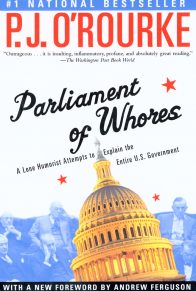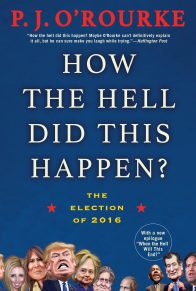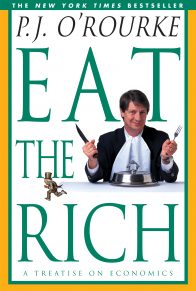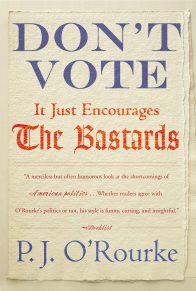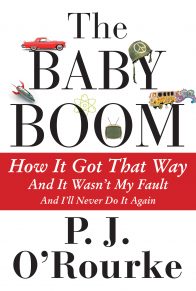Then, in the fall of 1962, when I was fifteen, Armageddon really did seem to arrive. I made an earnest plea to my blond, freckled biology-class lab partner (for whom, worshipfully, I had undertaken all frog dissection duties). “The Cuban missile crisis,” I said, ‘means we probably won’t live long. Let’s do it before we die.” She demurred. All in all the Cold War was a bad thing.
Twenty-seven years later, wandering through previously sinister Checkpoint Charlie with beer in hand, I felt like a weight had been lifted from my shoulders. I remember thinking just those words: “I feel like a weight has been lifted “” A wiser person would have been thinking, “I feel like I took a big dump.”
Nastiness was already reaccumulating. I reported on some of it in ex-Soviet Georgia, ex-Yugoslav Yugoslavia, the West Bank, Somalia, and Iraq-ravaged Kuwait. The relatively simple, if costive, process of digesting the Communist bloc was complete. America needed to reconstitute its foreign policy with–so to speak–a proper balance of fruit and fiber. The serious people who ponder these things seriously said the new American foreign policy must include:
” Nation-building;
” A different approach to national security;
” Universal tenets of democracy.
This didn’t occur to me. Frankly, nothing concerning foreign policy had ever occurred to me. I’d been writing about foreign countries and foreign affairs and foreigners for years. But you can own dogs all your life and not have ‘dog policy.” You have rules, yes–Get off the couch!–and training, sure. We want the dumb creatures to be well behaved and friendly. So we feed foreigners, take care of them, give them treats, and, when absolutely necessary, whack them with a rolled-up newspaper. That was as far as my foreign policy thinking went until the middle 1990s, when I realized America’s foreign policy thinking hadn’t gone that far.
In the fall of 1996, I traveled to Bosnia to visit a friend whom I’ll call Major Tom. Major Tom was in Banja Luka serving with the NATO-led international peacekeeping force, IFOR. From 1992 to 1995 Bosnian Serbs had fought Bosnian Croats and Bosnian Muslims in an attempt to split Bosnia into two hostile territories. In 1995 the U.S.-brokered Dayton Agreement ended the war by splitting Bosnia into two hostile territories. The Federation of Bosnia and Herzegovina was run by Croats and Muslims. The Republika Srpska was run by Serbs. IFOR’s job was to “implement and monitor the Dayton Agreement.” Major Tom’s job was to sit in an office where Croat and Muslim residents of Republika Srpska went to report Dayton Agreement violations.
“They come to me,” said Major Tom, “and they say, “The Serbs stole my car.” And I say, “I’m writing that in my report.” They say, “The Serbs burned my house.” And I say, “I’m writing that in my report.” They say, “The Serbs raped my daughter.” And I say, “I’m writing that in my report.””
“Then what happens?” I said.
“I put my report in a file cabinet.”
Major Tom had fought in the Gulf War. He’d been deployed to Haiti during the American reinstatement of President Aristide (which preceded the recent American unreinstatement). He was on his second tour of duty in Bosnia and would go on to fight in the Iraq war. That night we got drunk.
“Please, no nation building,” said Major Tom. “We’re the Army. We kill people and break things. They didn’t teach nation building in infantry school.”
Or in journalism school, either. The night before I left to cover the Iraq war I got drunk with another friend, who works in TV news. We were talking about how–as an approach to national security–invading Iraq was ” different. I’d moved my family from Washington to New Hampshire. My friend was considering getting his family out of New York. ‘don’t you hope,” my friend said, “that all this has been thought through by someone who is smarter than we are?” It is, however, a universal tenet of democracy that no one is.
Americans hate foreign policy. Americans hate foreign policy because Americans hate foreigners. Americans hate foreigners because Americans are foreigners. We all come from foreign parts, even if we came ten thousand years ago on a land bridge across the Bering Strait. We didn’t want anything to do with those Ice Age Siberians, them with the itchy cave-bear-pelt underwear and mammoth meat on their breath. We were off to the Pacific Northwest–great salmon fishing, blowout potluck dinners, a whole new life.
America is not “globally conscious’ or ‘multicultural.” Americans didn’t come to America to be Limey Poofters, Frog-Eaters, Bucket Heads, Micks, Spicks, Sheenies, or Wogs. If we’d wanted foreign entanglements, we would have stayed home. Or–in the case of those of us who were shipped to America against our will, as slaves, exiles, or transported prisoners–we would have gone back. Events in Liberia and the type of American who lives in Paris tell us what to think of that.
Being foreigners ourselves, we Americans know what foreigners are up to with their foreign policy–their venomous convents, lying alliances, greedy agreements, and trick-or-treaties. America is not a wily, sneaky nation. We don’t think that way. We don’t think much at all, thank God. Start thinking and pretty soon you get ideas, and then you get idealism, and the next thing you know you’ve got ideology, with millions dead in concentration camps and gulags. A fundamental American question is “What’s the big idea?”
Americans would like to ignore foreign policy. Our previous attempts at isolationism were successful. Unfortunately, they were successful for Hitler’s Germany and Tojo’s Japan. Evil is an outreach program. A solitary bad person sitting alone, harboring genocidal thoughts, and wishing he ruled the world is not a problem unless he lives next to us in the trailer park. In the big geopolitical trailer park that is the world today, he does.
America has to act. But, when America acts, other nations accuse us of being “hegemonistic,” of engaging in “unilateralism,” of behaving as if we’re the only nation on earth that counts.
We are. Russia used to be a superpower but resigned “to spend more time with the family.” China is supposed to be mighty, but the Chinese leadership quakes when a couple of hundred Falun Gong members do tai chi for Jesus. The European Union looks impressive on paper, with a greater population and a larger economy than America’s. But the military spending of Britain, France, Germany, and Italy combined does not equal one third of the U.S. defense budget. The United States spends more on defense than the aforementioned countries–plus Russia plus China plus the next six top defense-spending nations. Any multilateral military or diplomatic effort that includes the United States is a crew team with Arnold Schwarzenegger as coxswain and Nadia Comaneci on the oars. When other countries demand a role in the exercise of global power, America can ask another fundamental American question: “You and what army?”
Americans find foreign policy confusing. We are perplexed by the subtle tactics and complex strategies of the Great Game. America’s great game is pulling the levers on the slot machines in Las Vegas. We can’t figure out what the goal of American foreign policy is supposed to be.
The goal of American tax policy is avoiding taxes. The goal of American health policy is HMO profits. The goal of American environmental policy is to clean up the environment, clearing away scruffy caribou and seals so that America’s drillers for Arctic oil don’t get trampled or slapped with a flipper. But the goal of American foreign policy is to foster international cooperation, protect Americans at home and abroad, promote world peace, eliminate human rights abuses, improve U.S. business and trade opportunities, and stop global warming.
We were going to stop global warming by signing the Kyoto protocol on greenhouse gas emissions. Then we realized the Kyoto protocol was ridiculous and unenforceable and that no one who signed it was even trying to meet the emissions requirements except for some countries from the former Soviet Union. They accidentally quit emitting greenhouse gases because their economies collapsed. However, if we withdraw from diplomatic agreements because they’re ridiculous, we’ll have to withdraw from every diplomatic agreement, because they’re all ridiculous. This will not foster international cooperation. But if we do foster international cooperation, we won’t be able to protect Americans at home and abroad, because there has been a lot of international cooperation in killing Americans. Attacking internationals won’t promote world peace, which we can’t have anyway if we’re going to eliminate human rights abuses, because there’s no peaceful way to get rid of the governments that abuse the rights of people–people who are chained to American gym-shoe-making machinery, dying of gym shoe lung, and getting paid in shoelaces, thereby improving U.S. business and trade opportunities, which result in economic expansion that causes global warming to get worse.
As the nineteenth-century American naval hero Stephen Decatur said in his famous toast: “Our Country! In her intercourse with foreign nations may she always be in the right; but our country, right or wrong, should carry condoms in her purse.”
One problem with changing America’s foreign policy is that we keep doing it. After the Cold War, President George H. W. Bush managed to engage America–in spite of itself–in the multilateralism of the Gulf War. This left Saddam Hussein exactly where we found him twelve years later. Like other American achievements in multilateralism, it wasn’t something we’d care to achieve again. The east side of midtown Manhattan, where a decent slum once stood, is blighted by the United Nations headquarters. And, in the mountains of the Balkan peninsula, the ghost of Woodrow Wilson wanders Marley-like, dragging his chains and regretting the deeds of his life.
President Bill Clinton dreamed of letting the lion lie down with the lamb chop. Clinton kept International Monetary Fund cash flowing into the ever-criminalizing Russian economy. He ignored Kremlin misbehavior from Boris Yeltsin’s shelling of elected representatives in the Duma to Vladimir Putin’s airlifting uninvited Russian troops into Kosovo. Clinton compared the Chechnya fighting to the American Civil War (murdered Chechens being on the South Carolina statehouse Confederate-flag-flying side). Clinton called China America’s ‘strategic partner” and paid a nine-day visit to that country, not bothering himself with courtesy calls on America’s actual strategic partners, Japan and South Korea. Clinton announced, “We don’t support independence for Taiwan,” and said of Jiang Zemin, instigator of the assault on democracy protesters in Tiananmen Square, “He has vision.”
Anything for peace, that was Clinton’s policy. Clinton had special peace-mongering envoys in Cyprus, Congo, the Middle East, the Balkans, and flying off to attend secret talks with Marxist guerrillas in Colombia. Clinton made frantic attempts to close an Israeli-Palestinian peace deal. What if the Jews control the Temple Mount and the Arabs control the movie industry? On his last day in office, Clinton was still phoning Sinn Fein leader Gerry Adams. “Love your work, Gerry. Do you ever actually kill people? Or do you just do the spin?”
Clinton was everybody’s best friend. Except when he wasn’t. He conducted undeclared air wars against Serbia and Iraq and launched missiles at Sudan and Afghanistan. Clinton used the military more often than any previous peacetime American president. He sent armed forces into areas of conflict on an average of once every nine weeks.
Then we elected an administration with adults in it–Colin Powell, Dick Cheney, and Donald Rumsfeld. Gone was the harum-scarum Clinton policy-making apparatus with its frenzied bakeheads piling up midnight pizza boxes in the Old Executive Office Building. They disappeared, along with the clinically insane confidants–vein-popping James Carville, toe-sucking Dick Morris–and the loose haircuts in the West Wing and the furious harridan on the White House third floor.
President George W. Bush’s foreign policy was characterized, in early 2001, as ‘disciplined and consistent” (–Condoleezza Rice): “blunt” (–The Washington Post), and “in-your-face” (–the Carnegie Endowment for International Peace). Bush began his term with the expulsion of one fourth of the Russian diplomatic corps on grounds of espionage. He snubbed Vladimir Putin by delaying a first summit meeting until June 2001, and then holding it in fashionable Slovenia.
On April 1, 2001, a Chinese fighter jet, harassing a U.S. reconnaissance plane in international airspace, collided with the American aircraft, which was forced to land in Chinese territory. Bush did not regard this as an April Fools’ prank. By the end of the month he had gone on Good Morning America and said that if China attacked Taiwan, the United States had an obligation to defend it.
“With the full force of American military?” asked Charlie Gibson.
“Whatever it took,” said Bush.
The president also brandished American missile defenses at Russia and China. The Russians and Chinese were wroth. The missile shield might or might not stop missiles, but, even unbuilt, it was an effective tool for gathering intelligence on Russian and Chinese foreign policy intentions. We knew how things stood when the town drunk and the town bully strongly suggested that we shouldn’t get a new home security system.
In the Middle East, Bush made an attempt to let the Israelis and the Palestinians go at it until David ran out of pebbles and Goliath had been hit on the head so many times that he was voting for Likud. In Northern Ireland, Bush also tried minding his own business. And Bush quit negotiating with North Korea about its atomic weapons for the same reason that you’d quit jawing with a crazy person about the gun he was waving and call 911.
We saw the results of Clinton’s emotional, ad hoc, higgledy-piggledy foreign policy. It led to strained relations with Russia and China, increased violence in the Middle East, continued fighting in Africa and Asia, and Serbs killing Albanians. Then we saw the results of Bush’s tough, calculated, focused foreign policy–strained relations with Russia and China, increased violence in the Middle East, continued fighting in Africa and Asia, and Albanians killing Serbs. Between the first year of the Clinton administration and the first year of the Bush administration, we went from attack on the World Trade Center to World Trade Center attack.
Further changes could be made to U.S. foreign policy. For a sample of alternative ideas, we can turn to a group of randomly (even haphazardly) chosen, average (not to say dull-normal) Americans: the 2004 Democratic presidential hopefuls. By the time this is read, most of them will be forgotten. With luck, all of them will be. Nonetheless, it’s instructive to recall what ten people who offered themselves as potential leaders of the world deemed to be America’s foreign policy options.
Incessant activist Al Sharpton pleaded for “a policy of befriending and creating allies around the world.” The way Sharpton intended to make friends was by fixing the world’s toilets and sinks. “There are 1.7 billion people that need clean water,” he said, “almost three billion that need sanitation systems ” I would train engineers ” would export people that would help with these things.”
Ex-child mayor of Cleveland Dennis Kucinich promised to establish “a cabinet-level Department of Peace.” The secretary of peace would do for international understanding what the postmaster general does for mail.
Former one-term senator and erstwhile ambassador to New Zealand Carol Moseley Braun said, “I believe women have a contribution to make ” we are clever enough to defeat terror without destroying our own liberty ” we can provide for long-term security by making peace everybody’s business.” Elect me because women are clever busybodies. This is the “Lucy and Ethel Get an Idea” foreign policy.
Massachusetts’s thinner, more sober senator, John Kerry, said that he voted for threatening to use force on Saddam Hussein, but that actually using force was wrong. This is what’s known, in the language of diplomacy, as bullshit.
Previous almost-vice president Joe Lieberman indignantly demanded that Bush do somewhat more of what Bush already was doing: “Commit more U.S. troops,” create “an Iraqi interim authority,” and “work with the Iraqi people and the United Nations.” Perhaps Lieberman hadn’t gotten over coming this close to the office next to the oval one. Perhaps Lieberman was suffering from a delusion that he was part of the current presidential administration. But after 9/11 Americans wanted to kiss the Supreme Court. Imagine having a Democrat as commander in chief during the War Against Terrorism, with Oprah Winfrey as secretary of defense. Big hug for Mr. Taliban. Republicans are squares, but it’s the squares who know how to fly the bombers, launch the missiles, and fire the M-16s. Democrats would still be fumbling with the federally mandated trigger locks. And did Al Gore grow that beard for a while just in case the Taliban won?
Onetime governor of insignificant Vermont Howard Dean wanted a cold war on terrorism. Dean said that we’d won the Cold War without firing a shot (a statement that doubtless surprised veterans of Korea and Vietnam). Dean said that the reason we’d won the Cold War without firing a shot was because we were able to show the communists “a better ideal.” But what is the “better ideal” that we can show the Islamic fundamentalists? Maybe we can tell them, “Our president is a born-again. You’re religious lunatics–we’re religious lunatics. America was founded by religious lunatics! How about those Salem witch trials? Come to America and you could be Osama bin Ashcroft. You could get your own state, like Utah, run by religious lunatics. You could have an Islamic Fundamentalist Winter Olympics–the Chador Schuss.”
Since the gist of Howard Dean’s campaign platform was “It Worked in Vermont,” he really may have thought that the terrorists should take up snowboarding. On the other hand, the gist of General (very retired) Wesley Clark’s campaign platform was “It Worked in Kosovo.” Kosovo certainly taught the world a lesson. Wherever there’s suffering, injustice, and oppression, America will show up six months late and bomb the country next to where it’s happening.
The winner of South Carolina’s JFK look-alike contest, John Edwards, and the winner of Florida’s Bob Gramm look-alike contest, Bob Gramm, said that America had won the war in Iraq but was losing the peace because Iraq was so unstable. When Iraq was stable it attacked Israel in 1967 and 1973. It attacked Iran. It attacked Kuwait. It gassed the Kurds. It butchered the Shiites. It fostered terrorism in the Middle East. Who wanted a stable Iraq?
And perennial representative of the House of Representatives Dick Gephardt wouldn’t talk much about foreign policy. He was concentrating on economic issues, claiming that he’d make the American Dream come true for everyone. Gephardt may have been on to something there. Once people get rich they don’t go in much for war-making. The shoes are ugly and the uniforms itch. Someday Osama bin Laden will call a member of one of his ‘sleeper cells’–a person who was planted in the United States years before and told to live like a normal American–and “
‘dad, some guy named Ozzy’s on the phone.”
“Oh, uh, good to hear from you. Of course, of course ” Rockefeller Center? ” Next Wednesday? ” I’d love to, but the kid’s got her ballet recital. You miss something like that, they never forget it ” Thursday’s no good. I have to see my mom off on her cruise to Bermuda in the morning. It’s Fatima’s yoga day. And I’ve got courtside seats for the Nets ” Friday we’re going to the Hamptons for the weekend “”
But how, exactly, did Gephardt plan to make everyone on earth as materialistic, self-indulgent, and overscheduled as Americans? Would Gephardt give foreigners options on hot dot-com stocks? That might have worked during the Clinton years.
As of early 2004 there was one foremost, pressing question in U.S. foreign policy, and America didn’t seem to have the answers for postwar Iraq. Then again, what were the questions?
Was there a bad man? And his bad kids? Were they running a bad country? That did bad things? Did they have a lot of oil money to do bad things with? Were they going to do more bad things?
If those were the questions, was the answer “UN-supervised national reconciliation” or “Rapid return to self-rule”?
No. The answer was blow the place to bits.
Critics say we didn’t do enough thinking about the problem of postwar Iraq. I say we blew the place to bits–what’s the problem?
If there is something we didn’t do enough thinking about–something we haven’t done enough thinking about for sixty years–it’s fascism. The genius of fascism is to turn people into a mob. Baath Party fascism did a good job. Fascism doesn’t use only the stick; it uses the carrot as well, albeit in a brutal fashion. There’s a lot of being hit over the head with root vegetables involved in fascism. But Hitler would have ended up painting carnival sideshow posters in Bavaria if a mob of Germans hadn’t thought they were getting something out of fascism. And how do you plan for a mob? Do you buy The Martha Stewart Book of Gracious Rioting?
Americans have been surprised by Iraqi fascism, although we are familiar enough with other evil ideologies. Communism still persists in Cuba, North Korea, and the minds of a million university-type intellectuals. Religious extremism waxes worldwide. But communists do bad things for a purpose. They have a vision of a utopia where everyone shares everything and you give your Lawn Boy to a family in Chad. And religious extremists do bad things for a purpose. They have a vision of a utopia where everyone goes to heaven together. So what if you have to die to get there? You have to die to get to heaven anyway. Fascism, however, is a pointless ideology–the grasp of power for power’s sake. The fight against fascism seems like Dad’s war, Granddad’s war. Fascism should be out of date in the purposeful, task-oriented world of today. Never mind Slobodan Milosevic, Vladimir Putin, the Palestinian Authority, Somali warlords, Charles Taylor, China’s politburo, the Saudi royal family, murderous Hutu rabble, and Newt Gingrich’s career arc.
Fascists do bad things just to be bad. “I’m the baddest dude in Baghdad,” Saddam Hussein was saying,” the baddest cat in the Middle East. I’m way bad.” This was way stupid. But fascists are stupid. Consider Saddam Hussein’s weapons of mass destruction. He didn’t have any. How stupid does that make Saddam? All he had to do was say to UN chief weapons inspector Hans Blix, “Look where you want. Look beneath the couch cushions. Look under my bed. Look in the special spider hole I’m keeping for emergencies.” And Saddam Hussein could have gone on dictatoring away until Donald Rumsfeld is elected head of the World Council of Churches.
Instead, we blew the place to bits. And a mess was left behind. But it’s a mess without a military to fight aggressive wars; a mess without the facilities to develop dangerous weapons; a mess that cannot systematically kill, torture, and oppress millions of its citizens. It’s a mess with a message–don’t mess with us.
Saddam Hussein was reduced to the Unabomber, Ted Kaczynski, a nutcase hiding in the sticks. The terrorism his cohorts practice is terrifying, hence its name. Killing innocent people by surprise is not called “A Thousand Points of Light.” But as frightening as terrorism is, it’s the weapon of losers. When someone detonates a suicide bomb, that person does not have career prospects. And no matter how horrific the terrorist attack, it’s conducted by losers. Winners don’t need to hijack airplanes. Winners have an air force.





